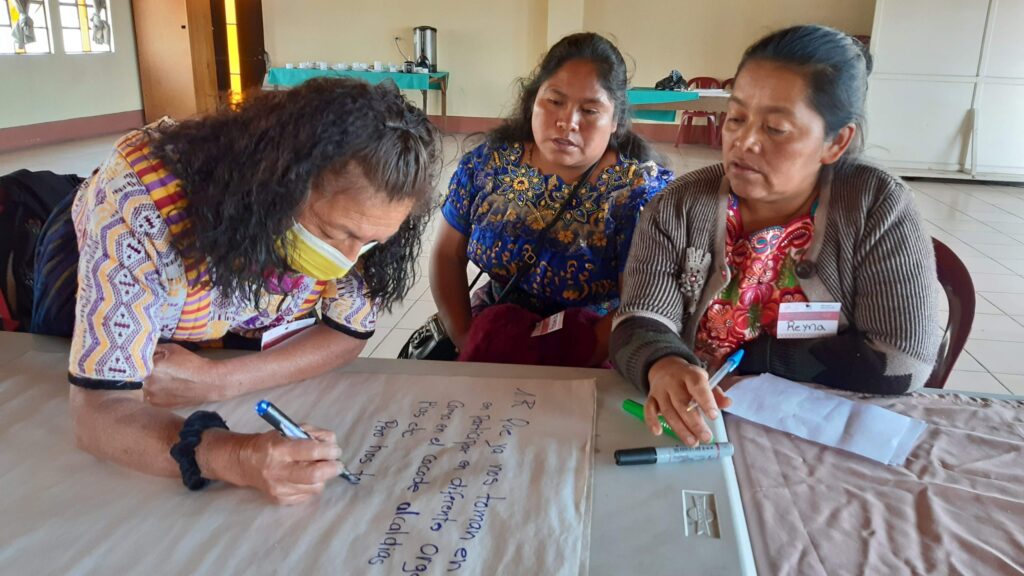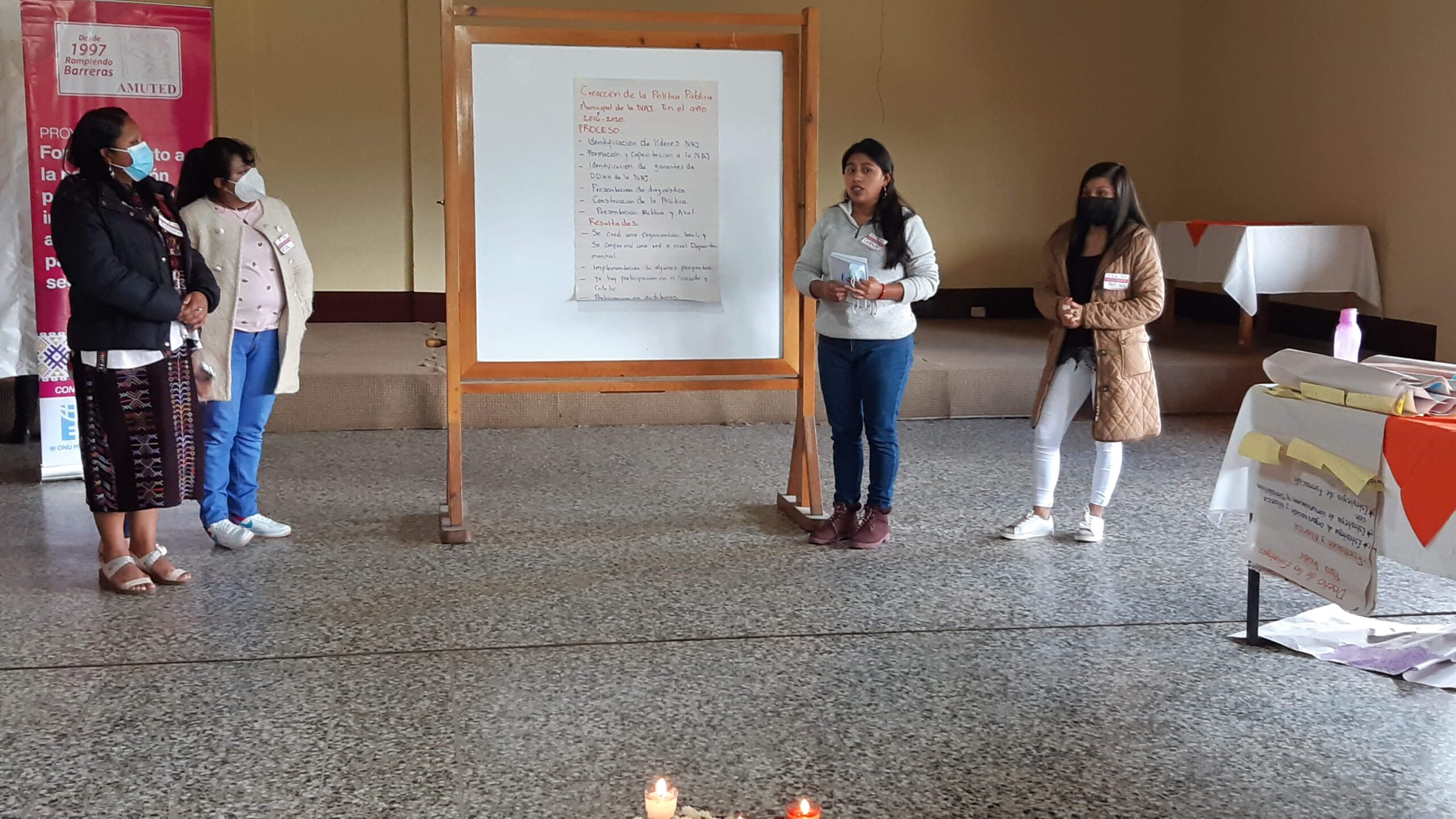Putting Indigenous women at the centre of peace building processes: A story from Guatemala

The Peace Accords signed between the Guatemalan Government and the leftist guerrilla represented by the Guatemalan National Revolutionary Unit (URNG) in 1996, put an end to a civil war that lasted more than three decades that disproportionately affected the countries indigenous populations.
The peace agreements established a set of commitments to address social inequality, guarantee the rights of indigenous people, and promote the active participation of women. The latter being “essential for the economic and social development of Guatemala.” Despite these provisions, the full implementation of the commitments established in the peace agreements continues to be a challenge. Machismo in public and private life, structural poverty, and racism against indigenous women has prevented the active participation of women in political scenarios and public debate in Guatemala.
In response to the lack of progress in the implementation of the Accords’ actions aimed at women, and their limited participation in the post-accord scenario, women’s civil society organizations have taken the lead.
Guatemalan Women’s right organization Asociación Mujer Tejedora del Desarrollo (AMUTED) is one such organisation, leading an initiative to strengthen the political participation of indigenous women of the Western Highlands for peace and security. Through their work, AMUTED established women’s networks at departmental level in Huehuetenango, Totonicapán, Sololá, Quiché and Quetzaltenango. Here women were provided with a safe space to exchange experiences, build alliances, strengthen their advocacy skills and learn about the peace agreements. These actions have opened paths towards greater visibility and political participation for indigenous women in Guatemala.
Best practices for greater impact
To have significant impact and implement changes that are sustainable, participating young, adult indigenous women leaders, recognized the importance of implementing and materializing advocacy actions in a collective and practical way, especially after completing training and agenda-building processes. The project was designed with the Mayan cosmovision as point of departure, where oral tradition and transfer of information and wisdom from elders to younger generations, is essential. The spaces created by AMUTED allowed for this to take place and included moments for healing of the trauma from structural discrimination and violence. The application of an intersectional approach considering gender and ethnicity allowed the success of the initiative.
AMUTED went beyond creating opportunities for reflection and training by exposing women to practical situations that strengthened their confidence and agency to carry out political advocacy actions. When describing the training, an indigenous woman shared:
“In one of the exercises they had us write a strategic plan, some of the colleagues were writing for the first time, but then when we reviewed what we had written, we said: wow! we are producers of knowledge. After that we felt much more comfortable when we presented the plan to key actors in the municipality.”
AMUTED also created key spaces for advocacy action. Regional encounters were organised with women participants from the different departments, which allowed to build common agendas for advocacy, provide visibility and recognition of women’s role in advocating for the recognition of indigenous women’s rights and the further implementation of the peace agreement’s commitments.
As a result of the training, participating indigenous women now have political advocacy agendas which are implemented at the local level with AMUTED’s coordination. Some of the key concerns raised by the women refer to the need for strengthening the institutionality on women’s issues that resulted from the peace agreements, the lack of programmes for indigenous women to access basic services such as education, health and justice, and the lack of an enabling environment and legal provisions to support women’s participation in decision-making.

Continued obstacles and opportunities for the future
To ensure sustainability of the change processes started by AMUTED, there is need for continued support, follow-up and mentorship for women’s networks and advocacy at local level, as well as to support the amplification of advocacy from local, to regional to national levels.
Indigenous women’s organisations, like AMUTED, face challenges to access sustainable financing to strengthen their internal capacity and provide continued support to local women’s leadership. Therefore, the importance of flexible and accessible mechanisms such as the Rapid Response Window of the Women, Peace and Humanitarian Fund. Additionally, confirming the importance of the role that organisations like NIMD can play in strengthening of local organisations to access funding and providing technical assistance while ensuring local ownership and leadership.
Part of a larger effort
This story is one of three case studies that NIMD has worked on as part of our work on women, peace and security in Latin America. We share the stories of women from Guatemala but also Colombia and Venezuela. This project is supported by the Rapid Response Window of the Women, Peace and Humanitarian Fund which addresses the funding gap on women’s participation in formal and informal peace processes. We invite you to read their stories documenting the resilience and commitment of women in the pursuit of sustainable peace here.
NIMD is committed to women’s participation in politics, decision-making and peacebuilding for more sustainable and inclusive peaceful democracies around the world. Globally it is recognised that including women and underrepresented populations in peace is linked to the consolidation of more sustainable peace. Despite this and the commitments made through the UNSC 1325 resolution, women’s meaningful participation in peace negotiations, the implementation of peace agreements and ongoing political processes continues to lag.
In Latin America, structural barriers such as restrictive gender norms, gender-based violence against women in politics and women social leaders, unsupportive policy and legal frameworks continue to affect women’s meaningful participation in decision-making, women’s influence in peace negotiations and the implementation of the gender provisions in peace agreements.
Despite the important differences between the conflict and peace dynamics in Colombia, Venezuela and Guatemala. From our own experience and that of our partners it is essential to create safe spaces for women to exchange and build common agendas, recognising the diversity of women. Use dialogue, mediation and advocacy methodologies to strengthen women’s confidence and capacities.